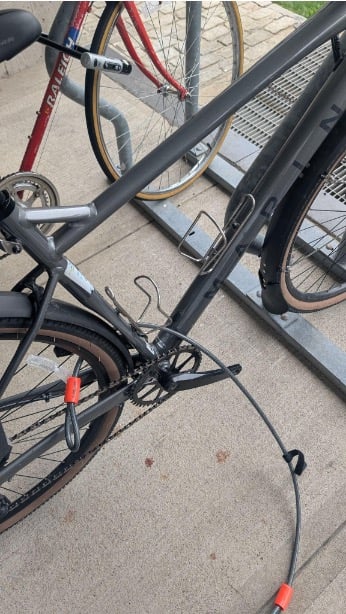
[Guest Post] Getting Help @ MIT by Jeremy W.
by Warren K. ’27
A thank you to all the supportive faculty & staff at the ’Tute
In my first month at MIT, I:
- Caught COVID, then a cold, then strep
- Had my parked car crashed into
- Moved from Hawaii (and had movers break half my stuff)
- Ran out of prescription meds (because my health insurance changed)
- Tripped so badly walking down Amherst Alley (on a completely flat surface) that my big toenail ripped off
- Injured my left knee (badly enough that I needed physical therapy)
- Had my cat get sick
- Had someone steal the pedals off my bicycle
- Had ten other appointments with the VA
- Had a few other problems I’d rather not share here
- Struggled with classes (see above)

I was late for class that day 🙁
After 12 years in the service, I got out of the Navy in August and started at MIT in September. I knew that this transition would be challenging. Juggling all of this and what I’ll call “normal adult things”—making a budget and paying bills, doing chores, taking care of myself, etc.—was a little overwhelming.
So when I felt like I was drowning, I asked for help. Asking for help can be a little scary. I think it’s especially hard at MIT because it means being vulnerable and admitting that you’re failing a little… and folks here aren’t used to failing. The biggest highlight of my first month here was experiencing how much MIT prioritizes supporting students.
Something I wish someone would have told me from the start is: you can’t even imagine the kind of support you’ll get. You don’t need to know what to ask for. You just need to reach out.
I didn’t start out knowing who to talk to or what to ask for. I started by asking one person… and they knew people in offices I didn’t know existed. MIT has offices full of people who spend their days listening and thinking of innovative ways to support the people here. The most critical piece of help that I got was someone listening to me and reminding me that I am capable of handling everything (thanks Justin!).
In my first month at MIT, I got help from:
- My academic advisor (Professor Voldman is the 🐐)
- Student Support Services (S3)
- MIT Health
- MIT Mental Health
- The professors and TAs teaching my classes
- MIT Undergraduate Advising Center (UAC)
- Student Veteran Success (SVS)
- Course 8 Academic Support Staff
- Disability and Accessibility Services (DAS)
- MIT Police & EMS
- MIT Admissions
This didn’t happen all at once. It started with an email to my academic advisor, then a phone call, then a couple of meetings (virtual and in-person) with some of these offices. Before I knew it, people I didn’t know existed were helping me solve my problems in ways I didn’t know they could be solved. For some offices, I just showed up and people either helped me right then or pointed me in the right direction.
I just finished my first semester. I didn’t struggle to complete any of my classes. All of the problems I listed earlier are resolved (except my car, which is fixed; I’m picking it up from the shop right after break). I’m looking forward to visiting my family during the break. When I return to MIT next semester, I’ll be doing it knowing something I didn’t know before: having a bad start to a semester doesn’t mean I’ll have a bad ending.
If I need help, all I have to do is ask.
Hi everybody, I’m Warren! I moved to Cambridge from Hawaii, one of the several places I was stationed during my 12+ years in the U.S. Navy. On my route to transferring to MIT in September 2024, I attended a small liberal arts college, a large flagship state university, a couple of community colleges and some Navy schools. At MIT I’m planning on double-majoring in 6-2 and 4-B, but I’m also interested in a bunch of classes in courses 2, 11, 15, and 22.
I graduated from high school in Memphis, TN and grew up in the South. On campus you can find me creating stuff in one of MIT’s many makerspaces or waiting in line at Bosworth’s for a warm drink (Bosworth’s exists in the 4th dimension and fits into ANY walking route through campus). This year I learned that rivers can freeze and that molasses is a deadly substance that can kill people.